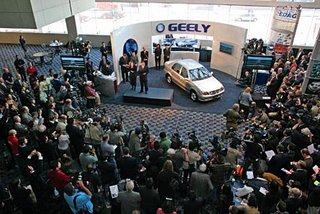Today I saw a sign on a the bilboard outside of a church:
"THE BIBLE SAYS IT
I BELIEVE IT
THAT'S GOOD ENOUGH FOR ME"
That gave me some pause for reflection:
Leviticus 11
11:1 And the LORD spake unto Moses and to Aaron, saying unto them, 11:2 Speak unto the children of Israel, saying, These are the beasts which ye shall eat among all the beasts that are on the earth. 11:3 Whatsoever parteth the hoof, and is clovenfooted, and cheweth the cud, among the beasts, that shall ye eat. 11:4 Nevertheless these shall ye not eat of them that chew the cud, or of them that divide the hoof: as the camel, because he cheweth the cud, but divideth not the hoof; he is unclean unto you. 11:5 And the coney, because he cheweth the cud , but divideth not the hoof; he is unclean unto you. 11:6 And the hare, because he cheweth the cud , but divideth not the hoof; he is unclean unto you.11:7 And the swine, though he divide the hoof, and be clovenfooted, yet he cheweth not the cud; he is unclean to you11:8 Of their flesh shall ye not eat, and their carcase shall ye not touch; they are unclean to you.11:9 These shall ye eat of all that are in the waters: whatsoever hath fins and scales in the waters, in the seas, and in the rivers, them shall ye eat.11:10 And all that have not fins and scales in the seas, and in the rivers, of all that move in the waters, and of any living thing which is in the waters, they shall be an abomination unto you:(11:10-12) Clams, oysters, crabs, lobsters, and shrimp are abominations. 11:11 They shall be even an abomination unto you; ye shall not eat of their flesh, but ye shall have their carcases in abomination. 11:12 Whatsoever hath no fins nor scales in the waters, that shall be an abomination unto you.11:13 And these are they which ye shall have in abomination among the fowls ; they shall not be eaten, they are an abomination: the eagle, and the ossifrage, and the ospray, (11:13, 19) Bats are birds to the biblical God 11:14 And the vulture, and the kite after his kind;11:15 Every raven after his kind; 11:16 And the owl, and the night hawk, and the cuckow, and the hawk after his kind,11:17 And the little owl, and the cormorant, and the great owl, 11:18 And the swan, and the pelican, and the gier eagle,11:19 And the stork, the heron after her kind, and the lapwing, and the bat.11:20 All fowls that creep, going upon all four, shall be an abomination unto you.11:21 Yet these may ye eat of every flying creeping thing that goeth upon all four, which have legs above their feet, to leap withal upon the earth;11:22 Even these of them ye may eat; the locust after his kind, and the bald locust after his kind, and the beetle after his kind, and the grasshopper after his kind.11:23 But all other flying creeping things, which have four feet, shall be an abomination unto you. 11:24 And for these ye shall be unclean: whosoever toucheth the carcase of them shall be unclean until the even. 11:25 And whosoever beareth ought of the carcase of them shall wash his clothes, and be unclean until the even.11:26 The carcases of every beast which divideth the hoof, and is not clovenfooted, nor cheweth the cud, are unclean unto you: every one that toucheth them shall be unclean.11:27 And whatsoever goeth upon his paws, among all manner of beasts that go on all four, those are unclean unto you: whoso toucheth their carcase shall be unclean until the even.11:28 And he that beareth the carcase of them shall wash his clothes, and be unclean until the even: they are unclean unto you.11:29 These also shall be unclean unto you among the creeping things that creep upon the earth; the weasel, and the mouse, and the tortoise after his kind, 11:30 And the ferret, and the chameleon, and the lizard, and the snail, and the mole. 11:31 These are unclean to you among all that creep: whosoever doth touch them, when they be dead, shall be unclean until the even. Don't touch any dead creeping things. 11:32 And upon whatsoever any of them, when they are dead, doth fall, it shall be unclean; whether it be any vessel of wood, or raiment, or skin, or sack, whatsoever vessel it be, wherein any work is done, it must be put into water, and it shall be unclean until the even; so it shall be cleansed. 11:33 And every earthen vessel, whereinto any of them falleth, whatsoever is in it shall be unclean; and ye shall break it.11:34 Of all meat which may be eaten, that on which such water cometh shall be unclean: and all drink that may be drunk in every such vessel shall be unclean. 11:35 And every thing whereupon any part of their carcase falleth shall be unclean; whether it be oven, or ranges for pots, they shall be broken down: for they are unclean and shall be unclean unto you. 11:36 Nevertheless a fountain or pit, wherein there is plenty of water, shall be clean: but that which toucheth their carcase shall be unclean.11:37 And if any part of their carcase fall upon any sowing seed which is to be sown, it shall be clean. 11:38 But if any water be put upon the seed, and any part of their carcase fall thereon, it shall be unclean unto you. 11:39 And if any beast, of which ye may eat, die; he that toucheth the carcase thereof shall be unclean until the even. 11:40 And he that eateth of the carcase of it shall wash his clothes, and be unclean until the even: he also that beareth the carcase of it shall wash his clothes, and be unclean until the even. 11:41 And every creeping thing that creepeth upon the earth shall be an abomination; it shall not be eaten."Every creeping thing that creepeth upon the earth shall be an abomination." 11:42 Whatsoever goeth upon the belly, and whatsoever goeth upon all four, or whatsoever hath more feet among all creeping things that creep upon the earth, them ye shall not eat; for they are an abomination. "Whatsoever goeth upon the belly, and whatsoever goeth upon all four, or whatsoever hath more feet ... are an abomination." 11:43 Ye shall not make yourselves abominable with any creeping thing that creepeth, neither shall ye make yourselves unclean with them, that ye should be defiled thereby. (11:43-44) "Ye shall not make yourselves abominable with any creeping thing that creepeth." 11:44 For I am the LORD your God: ye shall therefore sanctify yourselves, and ye shall be holy; for I am holy: neither shall ye defile yourselves with any manner of creeping thing that creepeth upon the earth.(11:44-45) "Ye shall be holy; for I am holy." Is only God holy? 11:45 For I am the LORD that bringeth you up out of the land of Egypt, to be your God: ye shall therefore be holy, for I am holy. 11:46 This is the law of the beasts, and of the fowl, and of every living creature that moveth in the waters, and of every creature that creepeth upon the earth: 11:47 To make a difference between the unclean and the clean, and between the beast that may be eaten and the beast that may not be eaten.
To Summarize:
Do not eat fat of ox, sheep or goats (Lev. 7.23)
Do not eat rabbit (Lev. 11:6)
Do not eat blood of fish, fowl or beast (Lev. 7:26)
Do not eat ham, bacon, pork chops or ribs (Lev. 11:7)
Do not eat lobster, crab, scallops or shrimp (Lev. 11:10 and Deut. 14:19)
Anything a woman touches during menstruation and for seven days thereafter is unclean (Lev. 12:6)
"Ye shall keep my statutes. Thou shalt not let thy cattle gender with a diverse kind: thou shalt not sow thy field with mingled seed: neither shall a garment mingled of linen and woollen come upon thee."
-Hybridization of animals and crops is condemned (Lev. 19:19)
-Do not wear clothing of two kinds of material (Lev. 19:19 and Deut. 22:11)
21:18 If a man have a stubborn and rebellious son, which will not obey the voice of his father, or the voice of his mother, and that, when they have chastened him, will not hearken unto them: 21:19 Then shall his father and his mother lay hold on him, and bring him out unto the elders of his city, and unto the gate of his place; 21:20 And they shall say unto the elders of his city, This our son is stubborn and rebellious, he will not obey our voice; he is a glutton, and a drunkard. 21:21 And all the men of his city shall stone him with stones, that he die: so shalt thou put evil away from among you; and all Israel shall hear, and fear.(Deuteronomy 21:18-21)
"...but, judge, dud, the bibe told me to stone my son."
"If thy brother, the son of thy mother, or thy son, or thy daughter, or the wife of thy bosom, or thy friend, which is as thine own soul, entice thee secretly, saying, Let us go and serve other gods, which thou hast not known, thou, nor thy fathers;" (Deuteronomy 13: 6)
"Thou shalt not consent unto him, nor hearken unto him; neither shall thine eye pity him, neither shalt thou spare, neither shalt thou conceal him: But thou shalt surely kill him; thine hand shall be first upon him to put him to death, and afterwards the hand of all the people." (Deuteronomy 13:8-9)
....Kill KILL KILL!
"Thou shalt surely smite the inhabitants of that city with the edge of the sword, destroying it utterly, and all that is therein, and the cattle thereof, with the edge of the sword." (Deuteronomy 13:15)
"Every one that is found shall be thrust through; and every one that is joined unto them shall fall by the sword. Their children also shall be dashed to pieces before their eyes; their houses shall be spoiled, and their wives ravished." (Isaiah 13:15-16)
...speaking of Babylon (modern day Iraq)
"And we took all his cities at that time, and utterly destroyed the men, and the women, and the little ones, of every city, we left none to remain." (Deuteronomy 2:34)
NUKE EM!
"The ultimate beatitude of man consists in the use of his highest function, which is the operation of his intellect...

Hence...the blessed see the essence of God." (Summa Theologica) - St. Thomas Aquinas
"And we utterly destroyed them, as we did unto Sihon king of Hesbon, utterly destroying the men, women, and children, of every city. But all the cattle, and the spoil of the cities we took for a prey to ourselves." (Deuteronomy 3:6-7)
"Thus saith the LORD of hosts, I remember that which Amalek did to Israel, how he laid wait for him in the way, when he came up from Egypt. Now go and smite Amalek, and utterly destroy all that they have, and spare them not; but slay both man and woman, infant and suckling, ox and sheep, camel and ass." (I Samuel 15:2-3)
"And the king said unto her, What aileth thee? And she answered, This woman said unto me, Give thy son, that we may eat him to day, and we will eat my son to morrow. So we boiled my son, and did eat him: and I said unto her on the next day, Give thy son, that we may eat him: and she hath hid her son...." (II Kings 6:28-29)
ok, so no ham or rabbit or lobster but after I kill my son it's ok to eat him? hmmmm....
"He that is wounded in the stones, or hath his privy member cut off, shall not enter into the congregation of the LORD. A bastard shall not enter into the congregation of the LORD; even to his tenth generation shall he not enter into the congregation of the LORD." (Deuteronomy 23:1-2)
...I know that MY ancestors raped and pilaged from Oldham Germany all the way to France, Ireland, Scotland and England... I'm really sorry that all you poor bastards who they raped can't come to church with me.
I suppose this is all summarized more aptly with the t-shirt I've seen:

well, at least that's pretty simple. Thanks for the easy summary General Boykin!
We came a long way over 200 years ago. We've learned alot. We can't create Gold in Lab. The World is not flat. Lobster is really good.
When in the Course of human events it becomes necessary for one people to dissolve the political bands which have connected them with another and to assume among the powers of the earth, the separate and equal station to which the Laws of Nature and of Nature's God entitle them, a decent respect to the opinions of mankind requires that they should declare the causes which impel them to the separation.
We hold these truths to be self-evident, that all men are created equal, that they are endowed by their Creator with certain unalienable Rights, that among these are Life, Liberty and the pursuit of Happiness. — That to secure these rights, Governments are instituted among Men, deriving their just powers from the consent of the governed, — That whenever any Form of Government becomes destructive of these ends, it is the Right of the People to alter or to abolish it, and to institute new Government, laying its foundation on such principles and organizing its powers in such form, as to them shall seem most likely to effect their Safety and Happiness. Prudence, indeed, will dictate that Governments long established should not be changed for light and transient causes; and accordingly all experience hath shewn that mankind are more disposed to suffer, while evils are sufferable than to right themselves by abolishing the forms to which they are accustomed. But when a long train of abuses and usurpations, pursuing invariably the same Object evinces a design to reduce them under absolute Despotism, it is their right, it is their duty, to throw off such Government, and to provide new Guards for their future security. — Such has been the patient sufferance of these Colonies; and such is now the necessity which constrains them to alter their former Systems of Government. The history of the present King of Great Britain is a history of repeated injuries and usurpations, all having in direct object the establishment of an absolute Tyranny over these States. To prove this, let Facts be submitted to a candid world.



























